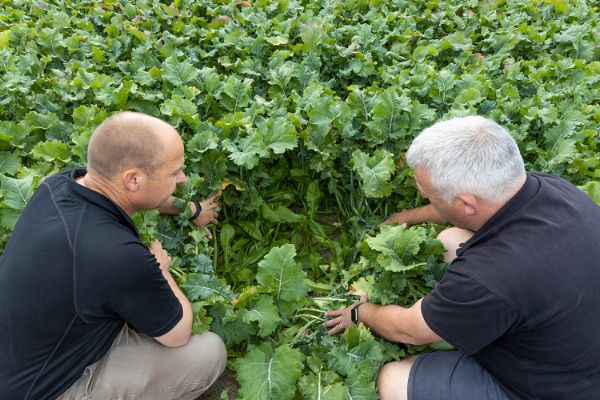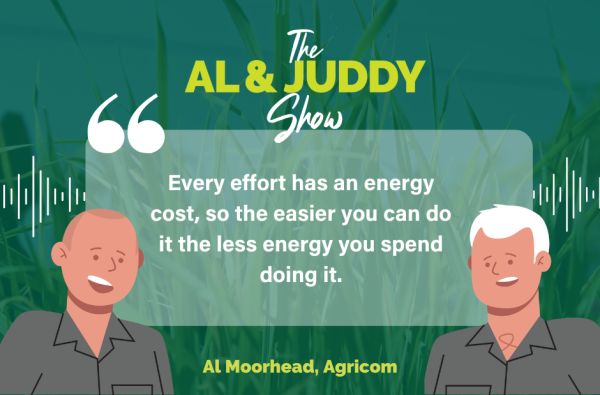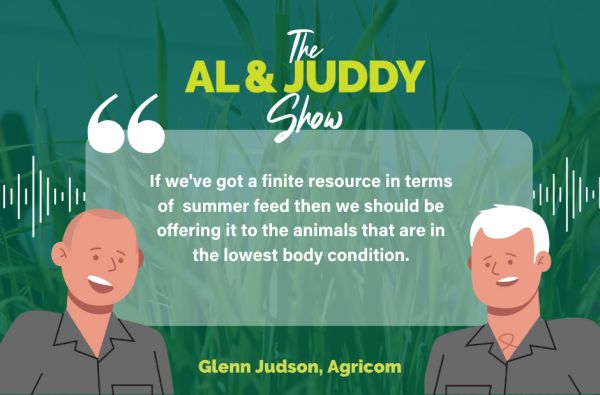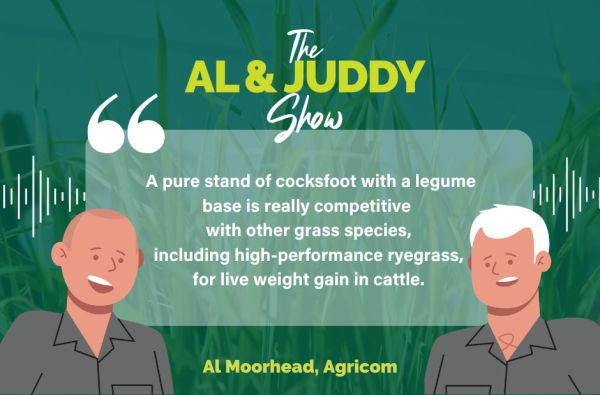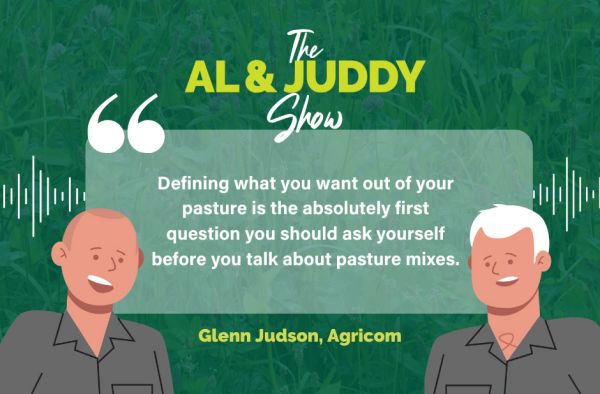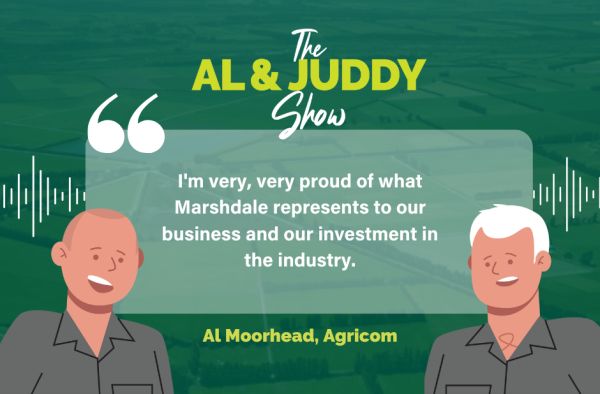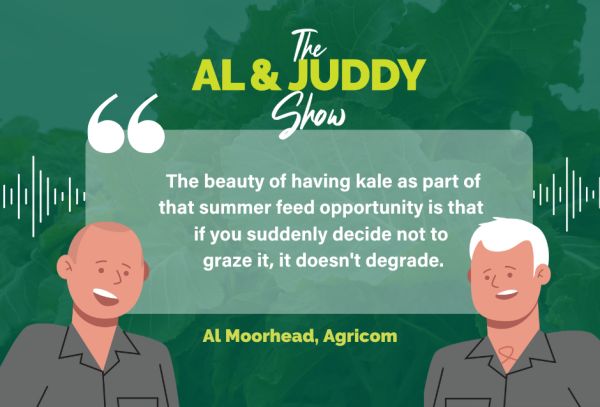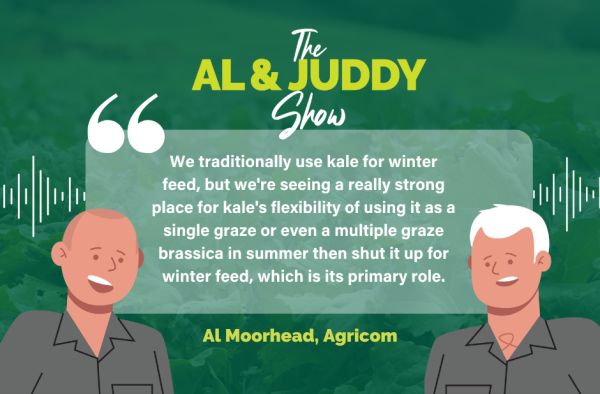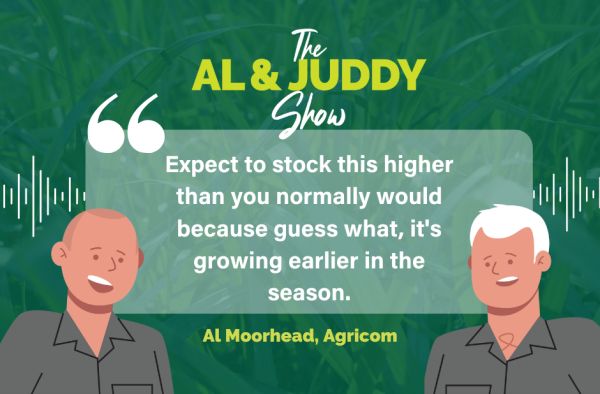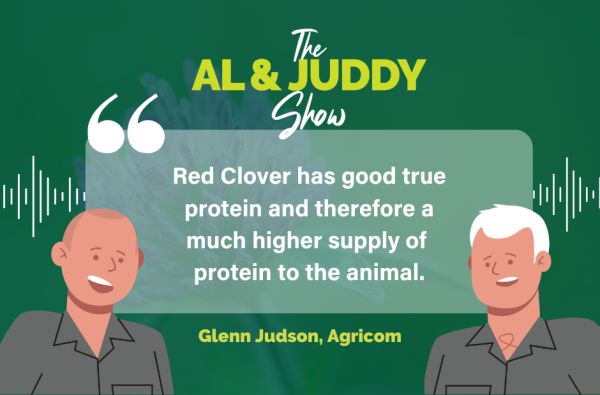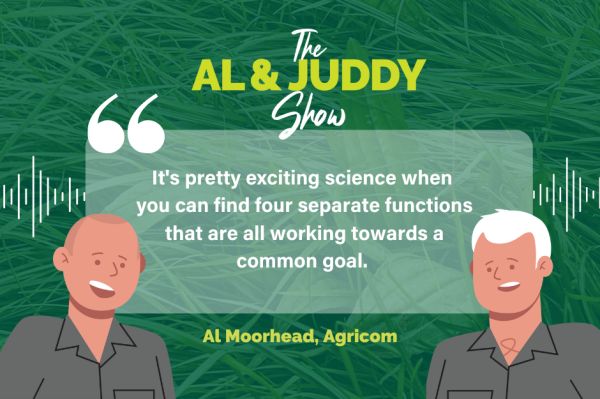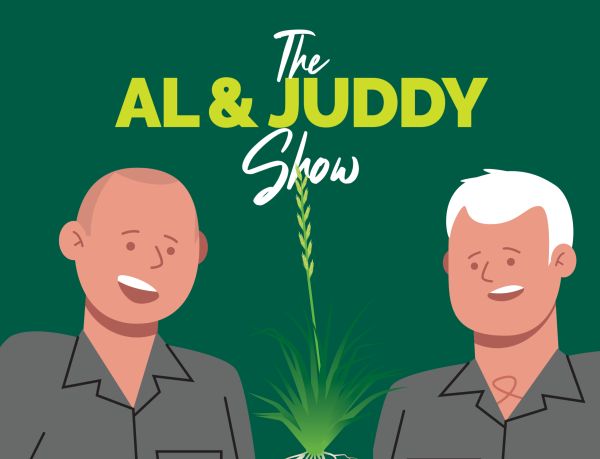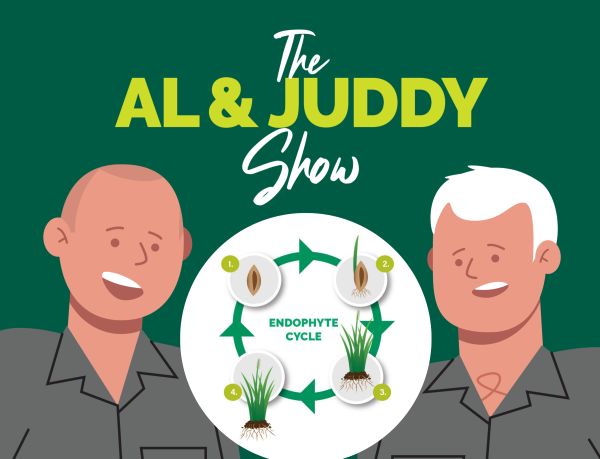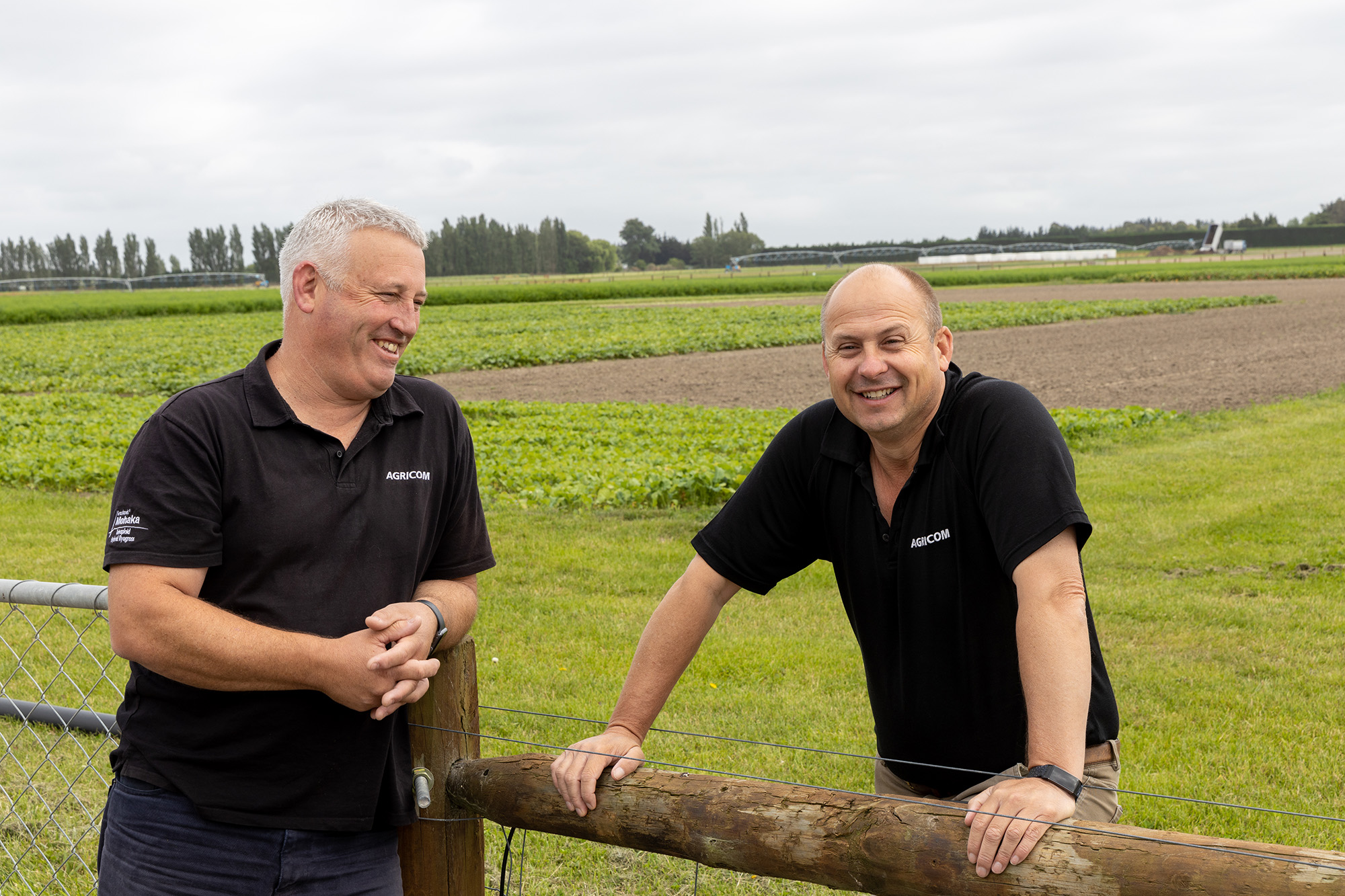- What on earth are Endophytes?
- Ryegrass types explained
- What’s not to like about White Clover
- Ecotain – the only proven environmental plantain
- Relish the rewards of red clover
- Productive and persistent fescues
- Summer Brassicas
- You’ve got kale
- Marshdale, where the rubber hits the road
- Pasture Mixes
- Dactylis - Cocksfoot
- Capital stock – feeding the engine
- Factors affecting intake
The Al & Juddy Show
Have you ever spent long nights awake thinking about the role of the different types of ryegrasses?
Or perhaps you pass your time on the tractor questioning Ecotain’s® ability to reduce nitrate leaching?
Al and Juddy are here to help explain the technical, practical, and sometimes humorous implications of forages and animal systems that keep New Zealand farmers leading the world.
Factors affecting intake
Join Al & Juddy in this episode as they delve into the four main factors that affect animal intake, and how this may impact your farming system.
From bite size and rate, to grams per bite and grazing duration, there are many factors to consider each with its own influence on animals.
Tune in to grasp how these effects impact your animals.
"In a pastoral system, grazing animals get their energy from grazing forages. Grazing intake, which refers to how much an animal can consume from pasture in a day, is affected by various factors that can make it easier or harder for the animal to consume pasture and ultimately affect their daily energy intake" – Glenn Judson
Capital stock – feeding the engine
Capital stock are a critical part of most production systems yet sometimes their importance is overlooked.
Al & Juddy take a farm systems approach in discussing forage and forage systems which feed this important stock class at critical times of the year.
Listen in to this general discussion on the principles of feeding next year’s production.
"Always focussing on driving pasture covers so that when we put a ewe with high energy demand into a set stock phase to be lambing, she's got enough feed underneath her with enough momentum to get to peak lactation as fast as possible." – Allister Moorhead
Dactylis - a dinosaur or a modern grass species?
Dactylis glomerata, orchard grass, cat grass, or most commonly ‘cocksfoot’ is often misunderstood and seen as a relic of the past with no relevance in today’s farming systems.
Al & Juddy bust this myth by dissecting its rich history and explaining cocksfoot’s resilience and productivity in a dryland environment.
Listen in and find out how you could reap the benefits of cocksfoot in your farming system.
‘Sometimes something that is not perfect is actually still really important. And if you don’t like it because it’s not perfect, you miss the fact this it’s actually still quite important’- Allister Moorhead
Pasture mixes – bringing the species together
This month Al and Juddy discuss the science behind seed mixes. They tackle how seed and plant characteristics, environment, and grazing management affect the balance of plants in a pasture.
“One thing I would always encourage you to do is be fully aware of what plant species you’re bringing into your landscape and actually know them, because making the mix is quite an important thing”
Marshdale, where the rubber hits the road
This month Al and Juddy explore the “jewel in the crown” for Agricom - Marshdale, our beef research and demonstration unit which evaluates new forage products and grazing techniques, and provides data on topical aspects of animal production.
Join the lads and let them explain “the science between the stones”.
"There’s very little accurate beef industry information in New Zealand regarding liveweight gain on different species, however, Marshdale fulfills and represents a really important role for the New Zealand beef industry"
You've got kale
Hang out with Al and Juddy this month as they do some “kale time” and take you on a journey with this amazing plant.
They cover aspects of biology, farm systems, animal health, and establishment considerations along with their normal banter.
"Kale is far more flexible than we've ever thought of before. The reality is it can fit inside your feed program in more ways than we have traditionally used it."
Ep7: Summer Brassicas
This month Al & Juddy share their expertise on one of their favourite topics, summer brassicas.
Join the lads while they discuss and give examples on linking summer brassicas to farm systems, along with a summary on the history around summer brassica grazing management.
Including tips and tricks on getting summer brassicas reliably established and, thoughts around maximising performance across various stock classes.
“Know your summer brassica, and get the right one for your forage needs, your farm system and your climatic variability”
Ep6: Productive and persistent fescues
Fescues are often considered an alternative to ryegrass and can be a great fit in many farming systems.
Let Al and Juddy take you through the A-Z of this species, from its history through to relevant systems use and don’t forget to listen out for Juddy’s Top 5 Grazing Tips!
“Even if it’s a colder year, you still get that flush of feed coming in.”
Ep5: Relish the rewards of red clover
Red clover is a powerhouse in a pasture and can have real animal performance advantages, so let Al and Juddy talk you through the ins and outs of this legume, as well as how it can best fit into a farming system.
Ep4: Ecotain – the only Environmental Plantain
There’s been a lot of chatter about Ecotain and its benefits to the environment so Al and Juddy have jumped on to cover how it works to help solve some of the environmental problems that farmers are facing.
They will also talk about how you can get it to work on your farm and how you can use it to achieve the functionality that may be required going forward.
Ep3: What’s not to like about White Clover?
Al and Juddy are back to let us know about the wonder plant that is white clover: how important it is to farmers in New Zealand, the different types and how they are best utilised, its role in nitrogen fixation and the benefits to our animals. All of this as well as a bit of an introduction about themselves and how they came to be sitting in front of a microphone.
"The more clover you can get in there, the higher the performance of those animals."
Our animals love to eat it and we love to grow it, but what really are the differences in the varieties of ryegrasses out there? From annual, hybrid and perennial types to diploids and tetraploids, there’s a lot to cover here, including one of the most overlooked factors in getting the best out of your ryegrass – its flowering date.
Let Al and Juddy take you for a wander through a topic on ryegrasses and get an appreciation for just how important it is to New Zealand’s agriculture.
"Ryegrass as a species is the single most important plant in the New Zealand economy."
Ep1: What on earth are Endophytes?
Ever wondered how endophytes benefit the grass in which they live or how they affect the animals grazing on them?
Al Moorhead and Glenn Judson are here to fill in all the gaps; from just what endophytes are, what they mean to New Zealand, how they pass through generations of ryegrass and how they help with various pasture pests.
Endophytes are a vital tool in many farmers' toolboxes, so make sure to listen in!
More episodes of the Al & Juddy podcast will be released monthly and are available on the Agricom website, YouTube, Spotify, Apple Podcasts, Google Podcasts, Amazon Music, pod.co, Deezer or whichever app you choose to listen to podcasts.
Tune in from your tractor, ute, or couch today.
Introducing Al
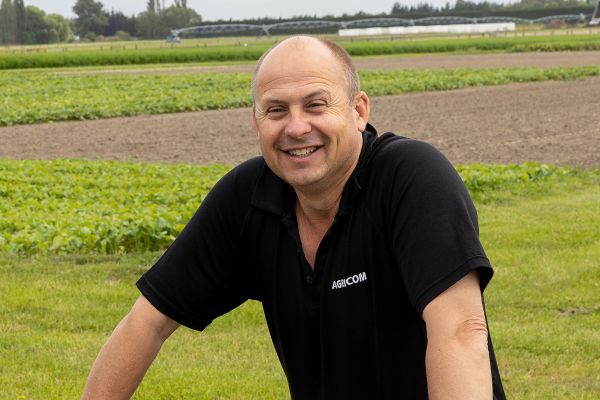
Allister Moorhead (Al) is Agricom’s Senior Agronomist and Product Development Specialist and with almost 30 years in the industry, has a wealth of practical knowledge and experience in all things agronomy. Having provided agronomic support throughout New Zealand, Australia and South America, Al has first-hand knowledge of most forage plants in most environments and situations. For a practical, down-to-earth view on a range of relevant topics, Al’s worth a listen.
Meet Juddy
With 20 years of industry experience, Dr Glenn Judson (Juddy) is Agricom’s Nutritional and Farm Systems Specialist and leads an extensive research programme aimed at developing plant-based solutions for a range of industry challenges. Glenn has travelled extensively through New Zealand and Australia providing technical support on matters of forage nutrition and grazing management. For an animal-specific view on forages and grazing systems tune in to Juddy’s unique perspective.
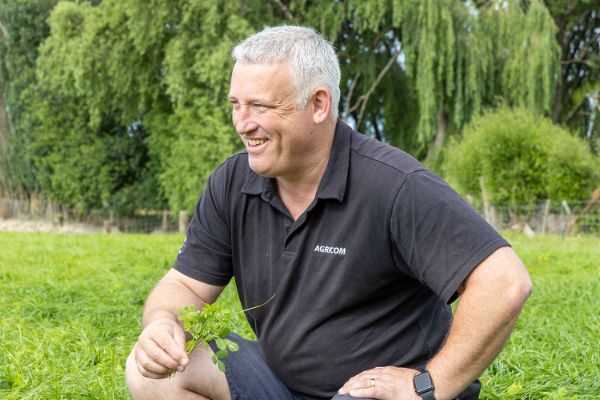
- What on earth are Endophytes?
- Ryegrass types explained
- What’s not to like about White Clover
- Ecotain – the only proven environmental plantain
- Relish the rewards of red clover
- Productive and persistent fescues
- Summer Brassicas
- You’ve got kale
- Marshdale, where the rubber hits the road
- Pasture Mixes
- Dactylis - Cocksfoot
- Capital stock – feeding the engine
- Factors affecting intake
